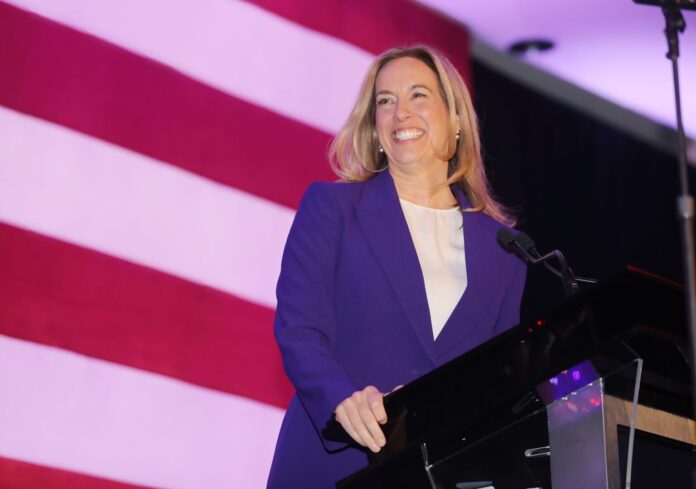New Jersey’s political landscape is entering a new chapter with the election of Democrat Mikie Sherrill as the state’s second female governor, promising a broad policy agenda aimed at affordability, clean energy, housing development, and reproductive rights. Her victory over Republican Jack Ciattarelli on November 4, 2025, solidifies a Democratic hold on the governor’s office for the third consecutive term—a milestone not seen since 1961—and sets the stage for significant state-level reforms.
Affordability is central to Sherrill’s agenda. On her first day in office, she plans to declare a state of emergency on utility costs, temporarily freezing rates while promoting expanded clean power generation, including solar and battery storage, to reduce long-term energy bills. Sherrill also intends to expand access to the Child Tax Credit and the Earned Income Tax Credit, eliminate the state business registration fee, and close tax loopholes for corporations and high-net-worth individuals. Property taxes remain a top concern, and the administration plans to encourage shared municipal services while maintaining programs like ANCHOR and Stay NJ to provide relief for homeowners.
Housing and urban development are also key priorities. Sherrill aims to add 100,000 new affordable units through targeted developer tax incentives and streamlined permitting processes. Plans include converting underused commercial properties and brownfields into residential spaces, bringing new housing stock to urban centers and suburban towns alike.
On the environmental front, Sherrill’s administration will continue New Jersey’s trajectory toward a zero-emissions power grid. State-led investments in solar projects on landfills, parking lots, and other state-owned properties are expected, along with advocacy to ensure grid operators maximize clean energy utilization. Additionally, Sherrill has pledged to use the Attorney General’s office to counter federal actions that hinder climate initiatives, including efforts to block wind power projects or claw back federal funding from schools and community programs.
Healthcare and social policy reforms are also on the agenda. Sherrill plans to increase transparency in health insurance and pharmacy benefit management, explore enhancements to the Affordable Care Act through a potential public option, and expand reproductive healthcare access by enshrining abortion rights in the state constitution while broadening contraception and IVF availability. Education initiatives include addressing pandemic-related learning loss with targeted tutoring programs, expanding universal pre-K, and increasing mental health services in schools.
The governor’s election coincides with other significant political developments. U.S. Rep. Bonnie Watson Coleman, New Jersey’s first Black congresswoman, announced she will retire in January 2027 after a 55-year career in state and federal politics. Her retirement has already sparked competitive speculation among Democrats seeking her seat, reflecting the ongoing reshuffling within New Jersey’s political landscape.
In the congressional arena, Brendan Gill officially launched his campaign for New Jersey’s CD-11 seat outside his childhood home in Essex County, drawing a crowd despite a steady rain. Gill emphasized his deep community roots, longstanding relationships with local leaders, and commitment to issues like safe streets, youth programs, arts education, and food security. His campaign highlights broad endorsements from community figures, including Grammy Award winner Melissa Walker of Jazz House Kids, and Debra Kagan, a local leader advocating for safe streets and active transportation. Gill’s platform focuses on practical, locally informed representation in Congress, aiming to ensure that constituents have an experienced advocate familiar with the unique needs of the district.
Other policy and legislative updates include ongoing debates over charter school regulations, climate change legislation, and SNAP benefits. The New Jersey Legislature is considering tighter oversight of charter schools, while environmental groups plan a Day of Action in Trenton to push the NJ Climate Superfund Act, seeking accountability for fossil fuel corporations. Meanwhile, the state successfully issued full November SNAP benefits following legal intervention to block federal attempts to withhold funding, though challenges remain in the courts.
With a Democratic-controlled Assembly backing Sherrill, New Jersey is poised for a series of ambitious reforms addressing affordability, energy, healthcare, and housing, alongside active political realignment in congressional and state-level offices. Sherrill’s tenure is shaping up to be transformative, with a focus on pragmatic solutions to long-standing state challenges while maintaining progressive leadership in a dynamic political climate.
For more updates on New Jersey politics, housing, and legislative developments, visit Explore New Jersey’s Real Estate and Policy section.












